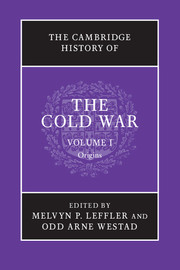Book contents
- Frontmatter
- 1 The Cold War and the international history of the twentieth century
- 2 Ideology and the origins of the Cold War, 1917–1962
- 3 The world economy and the Cold War in the middle of the twentieth century
- 4 The emergence of an American grand strategy, 1945–1952
- 5 The Soviet Union and the world, 1944–1953
- 6 Britain and the Cold War, 1945–1955
- 7 The division of Germany, 1945–1949
- 8 The Marshall Plan and the creation of the West
- 9 The Sovietization of Eastern Europe, 1944–1953
- 10 The Cold War in the Balkans, 1945–1956
- 11 The birth of the People’s Republic of China and the road to the Korean War
- 12 Japan, the United States, and the Cold War, 1945–1960
- 13 The Korean War
- 14 US national security policy from Eisenhower to Kennedy
- 15 Soviet foreign policy, 1953–1962
- 16 East Central Europe, 1953–1956
- 17 The Sino-Soviet alliance and the Cold War in Asia, 1954–1962
- 18 Nuclear weapons and the escalation of the Cold War, 1945–1962
- 19 Culture and the Cold War in Europe
- 20 Cold War mobilization and domestic politics: the United States
- 21 Cold War mobilisation and domestic politics: the Soviet Union
- 22 Decolonization, the global South, and the Cold War, 1919–1962
- 23 Oil, resources, and the Cold War, 1945–1962
- Bibliographical essay
- Index
- References
7 - The division of Germany, 1945–1949
Published online by Cambridge University Press: 28 September 2010
- Frontmatter
- 1 The Cold War and the international history of the twentieth century
- 2 Ideology and the origins of the Cold War, 1917–1962
- 3 The world economy and the Cold War in the middle of the twentieth century
- 4 The emergence of an American grand strategy, 1945–1952
- 5 The Soviet Union and the world, 1944–1953
- 6 Britain and the Cold War, 1945–1955
- 7 The division of Germany, 1945–1949
- 8 The Marshall Plan and the creation of the West
- 9 The Sovietization of Eastern Europe, 1944–1953
- 10 The Cold War in the Balkans, 1945–1956
- 11 The birth of the People’s Republic of China and the road to the Korean War
- 12 Japan, the United States, and the Cold War, 1945–1960
- 13 The Korean War
- 14 US national security policy from Eisenhower to Kennedy
- 15 Soviet foreign policy, 1953–1962
- 16 East Central Europe, 1953–1956
- 17 The Sino-Soviet alliance and the Cold War in Asia, 1954–1962
- 18 Nuclear weapons and the escalation of the Cold War, 1945–1962
- 19 Culture and the Cold War in Europe
- 20 Cold War mobilization and domestic politics: the United States
- 21 Cold War mobilisation and domestic politics: the Soviet Union
- 22 Decolonization, the global South, and the Cold War, 1919–1962
- 23 Oil, resources, and the Cold War, 1945–1962
- Bibliographical essay
- Index
- References
Summary
“The future of Germany was the question of questions and had to be looked at in its own terms. It was Germany that twice in a quarter-century had generated world war,” wrote Walt W. Rostow in 1972, when he analyzed the unfolding of the Cold War in Germany. Rostow, national security adviser to President Lyndon B. Johnson in the 1960s, had been personally involved in the planning of American policies toward Germany in 1946. He was aware of the fear, the despair, and the hatred that German warfare, German occupation of Europe, and German atrocities had stirred up. But by 1947 most American decisionmakers had shifted their worries from Germany to the Soviet Union.
How did this change come about? Why did the insoluble questions of joint occupation lead directly into the Cold War in Germany? And how should we assess this historical event from the vantage point of the early twenty-first century? These are the leading questions of this chapter.
Germany is our problem
“Germany is our problem,” wrote Secretary of the Treasury Henry Morgenthau in 1945. The measures to curb German power were many and they seemed justified: military government and an unlimited period of occupation; abolition of the German armed forces and elimination of the country’s industrial war potential; de-Nazification and punishment of all Germans involved in Nazi crimes; reparations to the Soviet Union on a gigantic scale as well as to the Western countries in order to restore – at least partly – the damages caused by Germany. In addition to occupation and security controls, radical structural changes seemed necessary. All sorts of recipes were on the table: “dismemberment” of the German Reich that, since its founding by Bismarck, in 1866 and 1871, had played a semi-hegemonic role in Europe and had ruled Europe from 1940 to 1944; the annexation of large portions of eastern and western Germany; a sharp reduction in the economic potential of this industrial giant; international control of the Ruhr; deep, perhaps revolutionary, reforms in many realms of economy, society, and administration; elimination of the economic, cultural, and administrative “old” elites that had joined up with Hitler’s party; reeducation.
- Type
- Chapter
- Information
- The Cambridge History of the Cold War , pp. 133 - 153Publisher: Cambridge University PressPrint publication year: 2010
References
- 1
- Cited by



